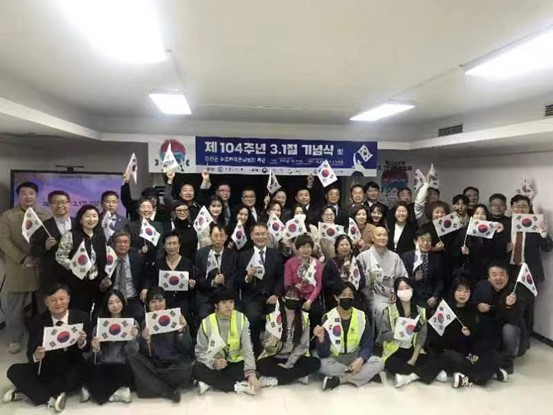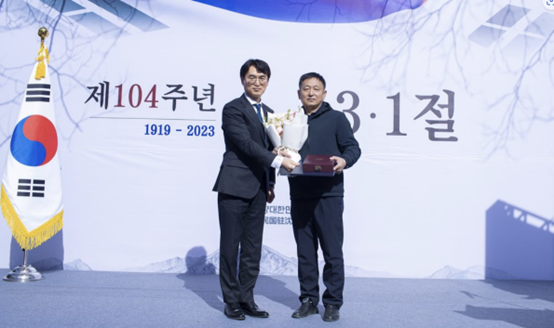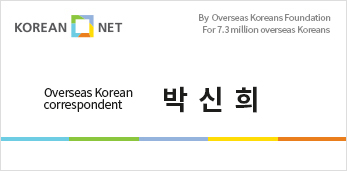Overseas Koreans Platform
- Main page
- Overseas Koreans Platform
- News Room
News Room
- Main page
- Overseas Koreans Platform
- News Room
- Country
- China
- Date
- 2023.03.17
Koreans residing in every corner of China cheered for their motherland in commemoration of the 104th anniversary of the March 1 Independence Movement.
China had been the largest stronghold for independence patriots to battle against Japanese colonial rule (1910–45) for the sake of the liberation of Korea.
Ceremonies marking the March 1 Independence Movement were held in many large cities in China, including Beijing, Shenyang, Guangzhou, Harbin, and Shanghai.
Descendants of the national independence honorees, Korean residents, and several Korean government officials working in China took part in the ceremonies in order to ruminate the true meaning of the historical movement and pay tribute to noble spirit of patriotic martyrs' sacrifice for Korea.
In a ceremony held in Beijing, the capital of China, many descendants of deceased national patriots took part in to honor the independence movement.

Participants take a commemorative group photo after a ceremony marking the March 1 Independence Movement in Beijing
Several distinguished descendants of independence honorees participated in a commemorative ceremony marking the March 1 Independence Movement held in the Korean Society of Beijing office located in Wangjing, Beijing. Some of the guests were Kim Yeon-ryeong, daughter of Kim Dong-jin who served as a chief secretary of the Provisional Government of Korea in Chongqing; Woo Byeong-hui, great-grandson for Woo Byeong-ryeol who was a military leader fighting against Japanese army; Jeong Mi-gyeong, daughter-in-law of Lee Hong-gwan who served as a liaison agent for the counter intelligence corps under the Korean independence army; and Jeong So-jae, daughter of Jeong Yul-seong who a member of the Korean heroic group and composed the March 1 march song. They all gathered in the ceremony to mediate patriotic spirit by giving three cheers for the nation.
Consulate General Kim Byeong-gwon of the Korean Embassy in China took part in the ceremony held in Beijing and delivered a commemorative speech on behalf of President Yun Seok-yeol of the Republic of Korea. Furthermore, in the ceremony, Korean students studying in Beijing recited the Declaration of the Independence Movement of 1919 and Kim Jin-gon, the head of the Korean Cultural Center in Beijing, gave a special lecture on the national independence movement and the foundation of Daejongism, a religious movement within the framework of Korean shaminism focused on the worship of Dangun, the legendary founder of the Korean race.
Meanwhile, the Anti-Japan History Memorial Society hosted a five-day photo exhibition beginning Mar. 1, honoring the national independence movement.
Portraits of renowned patriots, such as Lee Hoe-young, Kim Chang-sook, Shin Chae-ho, Nam Hyeong-woo, Park Yong-man, Won Se-hoon, Seo Wal-bo, Shin Sook, Jeong Hyeon-seop, Lee Yoon-jae, Kim Won-bong, and Ryu Ja-myeong, as well as photos of historical sites across China - where independence movements took place - taken by members of memorial society were on display.
"Before being wiped out, we wanted to save such photos of historical sites where independent fighters' lives and souls are buried as a record," Hong Seong-rim, the head of the memorial society, said. "We have planned for this exhibition in an effort to share with Korean residing here and I hope that the exhibition could serve as a momentum to promulgate the value of the March 1 Movement and patriots' sacrifices."

Consulate General Choi Hui-deok of of the Republic of Korea in Shenyang (left) bestows an order of merit to Park Ki-young, great-grandson of an independence activist Park Yeong, during a ceremony held in Shenyang
In the meantime, some 100 guests, including descendants of patriotic martyrs and Korean residents, participated in a commemoration held in Shenyang.
Consulate General Choi Hui-deok of the Republic of Korea in Shenyang, and other participants honored deceased Korean independence activists' noble spirit for their sacrifice for the sake of Korea's independence from Japanese colonial rule.
Park Ki-yeong, great-grandson of one of patriots Park Yeong who has been conferred posthumous honors from Korean government since 2006, was awarded an order of merit from Consulate General Choi.
Born in 1887 in Hamgyeongbuk-do, patriot Park Yeong served as a senior military officer for several units under the independence army since 1919, fighting against Japanese army around Manchuria region. In 1926, he served as a drill instructor at the Whampoa Military Academy.
"We will do our utmost to honor deceased independence patriots for their sacrifices for the sake of Korea's independence and pay our respect to bereaved families of those patriots. We will also do our best to preserve historical movement sites located in China's northeast provinces (i.e. Liaoning, Jilin, and Heilongjiang)," said Consulate General Choi.
A ceremony marking the March 1 Independence Movement took place also in Shanghai, China. Consulate General Kim Yeong-jun of the Republic of Korea in Shanghai hosted the ceremony at the Hangzhou Memorial Hall of the Korean Provisional Government. Consulate General Kim delivered a commemorative remarks on behalf of the President of the Republic of Korea.
Consulate General Kim took advantage of the ceremony to communicate with the members of Korean Chinese communities and other Koreans workers and students residing in China.
Korean Chinese communities in other major cities like Harbin and Guangzhou held commemorations to mark the 104th anniversary of the March 1 Independence Movement with participation by Korean residents and descendants of independence patriots.
